Fear & Loathing (and Freedom & Skepticism) in Las Vegas
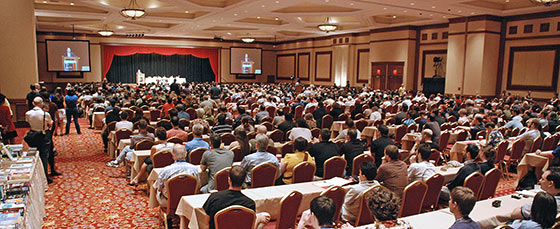
TAM7 boasted over 1000 attendees.
The Amazing Meeting 7 and Freedom Fest were both held over the same weekend in Las Vegas, the former at the new and beautiful South Point Hotel and the latter at the classic old Bally’s hotel and casino. I spoke at both and attended as many talks as I could fit in while shuttling back and forth between events. Some impressions:
Business is definitely down in Vegas. Every taxi driver I asked put the downturn at about 35% lower than normal, and between the two casinos we passed the new MGM-backed casino under construction but now abandoned due to lack of funding to complete construction. There were never any taxi lines and room rates at both hotels were well below the normal too-high rates. Nevertheless, there seemed to be plenty of folks at the slots and tables, trying to recover their 401K losses, obviously having never taken a basic course in probabilities (my system: I give the casino $500 and ask if I can play for a couple of hours: “you’re going to get the money anyway and I just want to have some fun.” I’ve never had success with this sytem.).
TAM had about 1000 people in attendance, while FreedomFest had about 1500. Shortly after I arrived I was called up for a private meeting with Randi, who later announced to the group that he had recently undergone a serious medical procedure to rid his body of something that wasn’t suppose to be there, and it looks like they got it all but just in case he’ll have to undergo chemo treatment after TAM, just to insure that there are no renegade cells floating about. When I saw Randi in his hotel room, his voice was a little weak and he seemed frail, yet the next morning when he stood at the podium to address his fans, he came to life, energized by the standing O he received, and suddenly his voice switched to his rich sonorous self as he regaled the audience with tales of his latest exploits among medics and psychics. Randi is such an experienced and professional entertainer that he just comes to life when there’s an audience. At age 80, I know that Randi is going to have a tough time of it (chemo is nasty business indeed), but he’s one of the toughest guys I know so I’m confident that we’ll have Randi around for many more years.
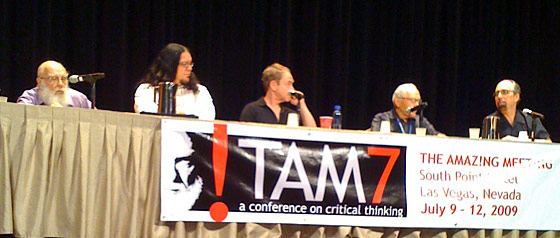
Randi, Penn, Teller, Ray Hyman, Jamy Ian Swiss. Only the scientist has two names; the magicians have either one or three names. Um…
On Friday afternoon I spoke at FreedomFest on myths about Darwin, including: that Darwin was an atheist (he was an agnostic); that acceptance of evolution theory leads to atheism (obviously not since 40% of American scientists — all of whom accept evolution — believe in God); that Darwin was always an evolutionist and got that from his grandfather Erasmus (Darwin was a creationist before and during the voyage of the Beagle and didn’t become an evolutionist until nearly a year after his return); that Darwin was a racial egalitarian (he was against slavery, and although he was very progressive in his social attitudes about race compared to his contemporaries, compared to people today Darwin, like his birthday twin Abraham Lincoln, did not believe that the races were biologically equal); that evolution is progressive and is “leading” somewhere (it isn’t leading anywhere — there are certain convergences in evolution, such as locomotion, hearing, seeing, etc., but there is nothing inevitable about, say, human intelligence); that evolution is “red in tooth and claw” and is nothing more than nasty, competitive, brutish, and bloody (a successful strategy for survival among social animals is pro-social, cooperative, and involves mutual aid among members of a group); and that conservatives should not accept evolution because it doesn’t explain human nature as Christians see it (in fact, as I argued in Why Darwin Matters, the Christian view of human nature is very similar to that of a Darwinian human nature). My talk seemed to go over well, perhaps because I share similar political and economic beliefs as the conservatives and libertarians at FreedomFest, so to have “one of their own” explain why it’s okay to accept evolutionary theory perhaps makes it all easier to swallow.
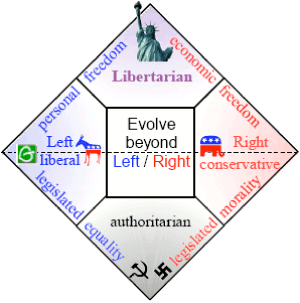
diagram by David Nolan
Likewise, I think that my talk at TAM Saturday morning, entitled “Rise Above: Toward a Type I Civilization,” was equally well received. At least everyone who said something to me afterwards seemed positive about it (perhaps my critics will just email me later). Even the famed magician Jamy Ian Swiss, who is most definitely not a libertarian, said he liked my talk. When I said “really?”, he responded, “yes, absolutely; of course, I still disagree with you on many points,” which I took as a compliment. During my talk I put up a side of a well-known heuristic diagram for classifying yourself politically, that moves beyond the traditional left — right spectrum.
I then asked for a show of hands among the 1,007 people in the audience of who identifies themselves as left of center (I estimated about 80%), libertarian (I estimated about 20%), and right of center (a grand total of 4 people raised their hands!). I then reviewed the standard left-right stereotypes of what liberals think of conservatives, and vice versa:
Conservatives are a bunch of gun-totting, Hummer-driving, hard-drinking, Bible-thumping, black-and-white-thinking, fist-pounding, shoe-stomping, morally-hypocritical blowhards.
Naturally, this received a huge round of applause, along with hooting and hollering in agreement. But, to my surprise, so too did my characterization of what conservatives think of liberals:
Liberals are a bunch of tree-hugging, whale-saving, hybrid-driving, sandle-wearing, bottled-water-drinking, ACLU-supporting, flip-flopping, wishy-washy, Namby Pamby bedwetters.
I then suggested that we need to “rise above” such stereotypes, and proposed a solution based on the research by the University of Virginia psychologist Jonathan Haidt and his model of morality that allows us to avoid being trapped by such linear left-right thinking in which one side is right and the other side is wrong. You can read my summary of Jonathan’s research in last week’s blog, but recall that Haidt argues that there are 5 foundations of morality:
- Harm-Care (do not harm others, people should be cared for)
- Fairness-Reciprocity (justice for all)
- In-group Loyalty (we live in a dangerous tribal world so we need group unity)
- Authority-Respect (a free society depends on the rule of law and law-and-order)
- Purity-Sanctity (conservatives: sex, drugs, rock’n’roll; liberals: food, environment)
Instead of one side being right and the other wrong, I think we would all be better served if we recognize that liberals and conservatives emphasize different moral values: Liberals are high on the Harm-Care and Fairness-Reciprocity dimensions, but low on Loyalty, Authority-Respect, Purity-Sanctity; whereas conservatives are about equal on the 5 dimensions (although slightly less on Harm-Care and Fairness-Reciprocity, slightly higher on Loyalty, Authority-Respect, Purity-Sanctity).
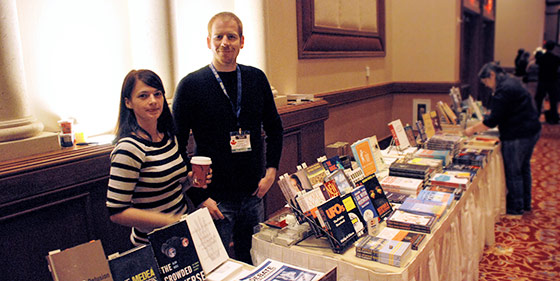
Volunteers Jason Loxton and Jillian Baker staff the Skeptics Society table.
As an example of this difference between emphasizing individual v. group morality, I showed a clip from one of my favorite films, Rob Reiner’s 1992 A Few Good Men, in which Jack Nicholson’s character — the battle-hardened Marine Colonel Nathan R. Jessup — is being cross-examined by Tom Cruise’s naive rookie Navy lawyer Lieutenant Daniel Kaffee. In the context of Haidt’s moral dimensions, I think of Kaffee as the liberal and Jessup as the conservative. Kaffee is defending two Marines accused of killing a fellow soldier named Santiago at Guantanamo base on Cuba. He thinks Jessup ordered a “code red,” an off-the-books command to rough up a lazy Marine trainee in need of discipline, and that matters got tragically out of hand. Kaffee wants answers to specific questions about the incident. Jessup wants to lecture him on the meaning of freedom and the need to defend it. The ensuing dialogue includes Jessup’s penetrating testimony about the true nature of human nature:
Jessup: You want answers?!
Kaffee: I want the truth.
Jessup: You can’t handle the truth!
Jessup (continuing): Son, we live in a world that has walls. And those walls have to be guarded by men with guns. Who’s gonna do it? You? I have a greater responsibility than you can possibly fathom. You weep for Santiago and you curse the Marines. You have that luxury. You have the luxury of not knowing what I know: That Santiago’s death, while tragic, probably saved lives. And my existence, while grotesque and incomprehensible to you, saves lives.
You don’t want the truth. Because deep down, in places you don’t talk about at parties, you want me on that wall. You need me on that wall. We use words like honor, code, loyalty … we use these words as the backbone to a life spent defending something. You use ’em as a punchline. I have neither the time nor the inclination to explain myself to a man who rises and sleeps under the blanket of the very freedom I provide, then questions the manner in which I provide it. I’d prefer you just said thank you and went on your way. Otherwise, I suggest you pick up a weapon and stand a post. Either way, I don’t give a damn what you think you’re entitled to.
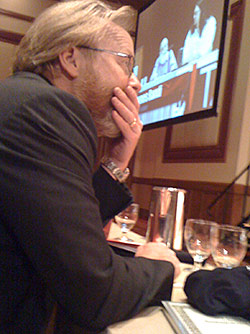
Who is the man and what is he thinking? Write your answer in the comments section.
The fact is we need all five moral dimensions. Personally, I tend more toward the liberal emphasis on individual fairness and justice and freedom, and I think our inner tribalisms are divisive and set people against one another, and so overemphasizing loyalty to group and nation can be dangerous. But ever since 9/11 I’ve come to see that we do live in a world with walls, and that those walls need to be guarded by men with guns. And when it comes to religious tribal fundamentalisms I think liberals agree with me on this point (certainly Sam Harris in The End of Faith and Richard Dawkins in The God Delusion make the point that fundamentalist religions are dangerous, and both are liberals).
In the long run, however, we need to rise above all this tribalism, and that’s what I mean by my lecture subtitle: “toward a Type I Civilization.” Next week I’ll outline the Kardashev scale of typing civilizations and suggest how we can move from where we are now to a global Type I civilization.

